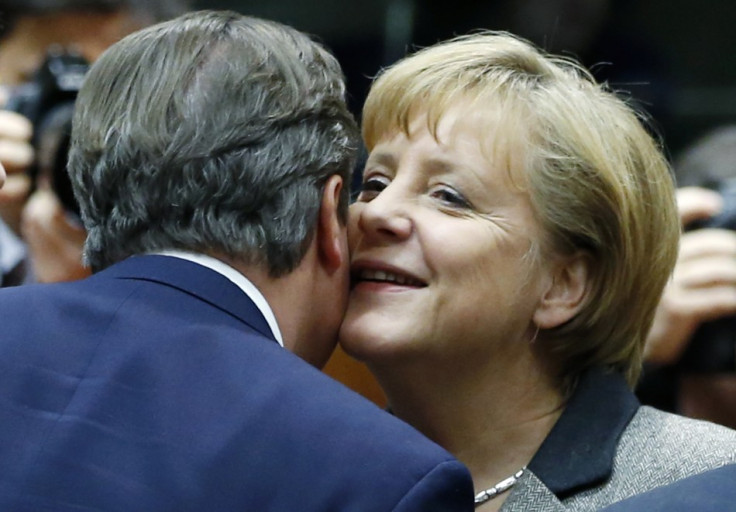Angela Merkel: EU needs 'A Strong United Kingdom'
The German Chancellor and David Cameron Still Don't See Eye-to-Eye on European Union Reform

German chancellor Angela Merkel may have been doing her utmost to emphasise her friendship with fellow conservative David Cameron, but her day-trip to London ultimately served only to graphically underline their political differences.
Merkel started her speech to both houses of parliament by bluntly dousing down any overblown expectations that she was in any way in favour of the sort of EU reforms being demanded by Tory Eurosceptics.
"Some expect my speech to pave the way for a fundamental reform of the European architecture which will satisfy all kinds of alleged or actual British wishes. I'm afraid they are in for a disappointment," she said.
Speaking to a packed House of Lords, she repeated her deeply-held belief that the EU needed Britain to remain a member and for the union to engage in some reforms, perhaps on freedom of movement and so-called benefits tourism for example, issues close to Cameron's heart.
"We need a strong United Kingdom with a strong voice inside the European Union. If we have that, we will be able to make the necessary changes for the benefit of all," she said.
But there was no mistaking the huge, fundamental division between their relative positions towards the EU which verge on the ideological.
In everything Merkel said, she underlined her belief in a "stronger, more stable and more competitive" EU.
Her stance remains a million miles away from the views held by many Tory backbenchers, not just the most outspoken Eurosceptics who will only be satisfied with British withdrawal.
It is fundamentally different in nature to the approach being taken, partly out of political necessity, by the prime minister and more pro-European members of the cabinet who are looking for repatriation of powers and a much looser relationship.
One of the problems for Merkel is that, also out of political necessity, Cameron has failed to set out exactly what it is he wants from any renegotiations which would allow him to go into his promised 2017 in-out referendum demanding an "in" vote.
And, of course, there is no guarantee that Cameron will even be prime minister after 2015, so the negotiations may never happen anyway.
The moment Cameron does provide a list of "red lines" for the way he wants the EU to develop, two things will immediately happen.
Leaders of the other 27 states will start chipping away at them, flatly rejecting some and seeking compromises on others and, at the same time, his so-called "irreconcilables" on the Tory backbenches will declare they aren't good enough anyway.
The truth is, in the wake of the eurozone crisis and the continuing growth and development of the EU, change was always going to be on the table. It is also the case that all member states will have their own agendas.
But the core issue is whether those agendas are working towards those goals of a more stable and, crucially, united EU or a looser alliance of states with significantly different goals from each other.
And the widely-held belief is that, while the other member states are all pretty-much signed up to the vision of a more united EU, Britain remains the fly in the ointment.
So, the best the prime minister could realistically have expected from this visit by "the Queen of Europe", as one German journalist called Merkel, was a symbolic show of unity and an expression that she would not simply slam the door in his face when he went looking for support during future negotiations.
He got both of those, but nothing more.
© Copyright IBTimes 2025. All rights reserved.






















